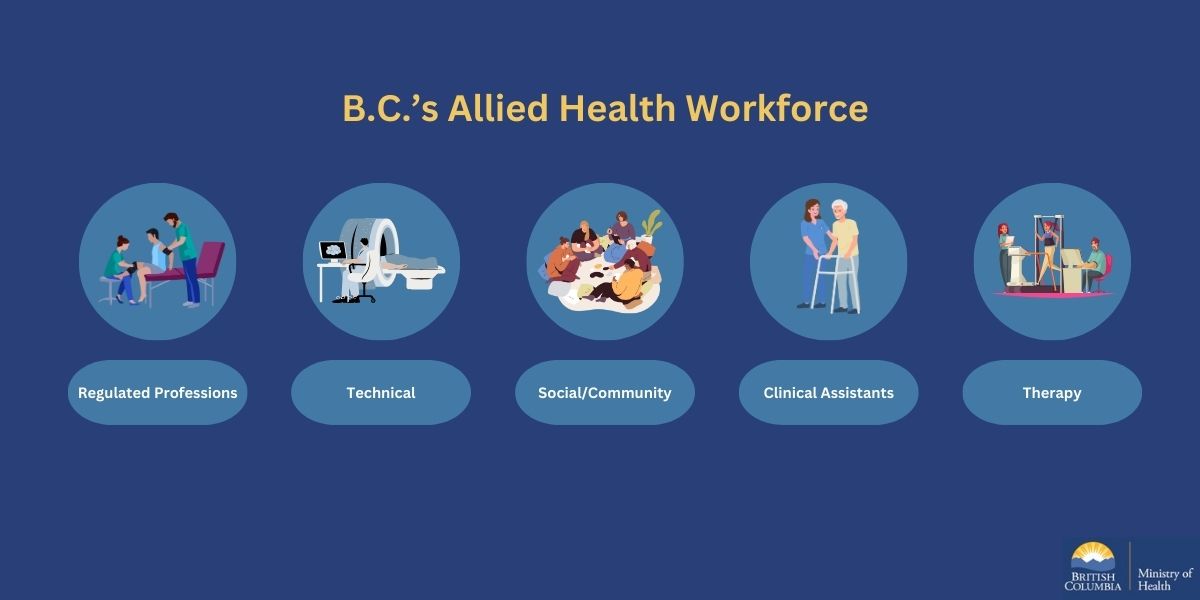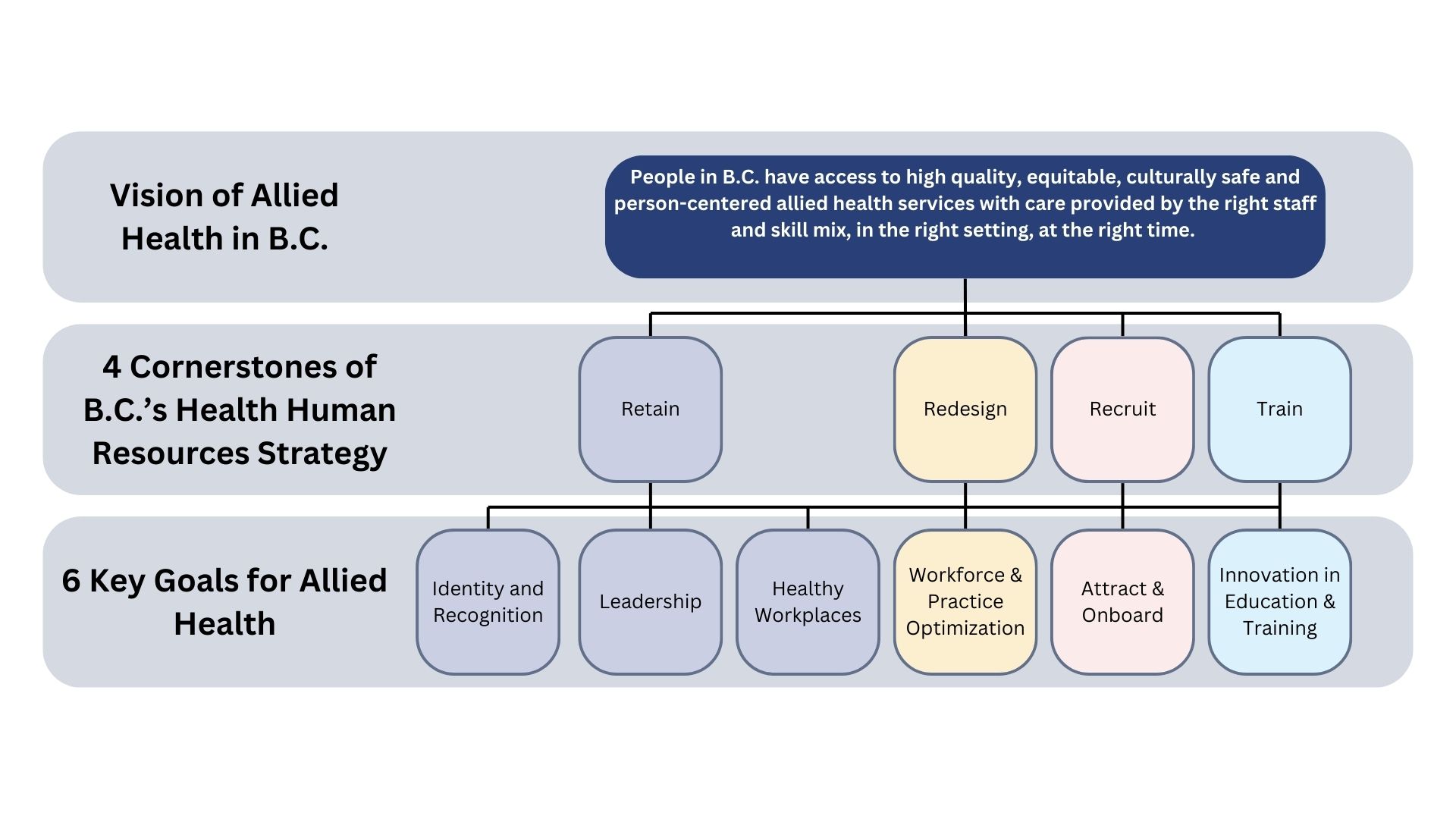Allied health professions and occupations
Explore how over 70 allied health professionals in B.C. provide a wide range of care, support and diagnostic services.
About allied health professions and occupations
In B.C, there are over 70 different allied heath disciplines. The allied health workforce provides a range of preventative, diagnostic, technical and therapeutic health care and clinical support services across the lifespan and care continuum.
They contribute specialized expertise, education, research, and leadership, often working as integral members of a collaborative health care team to improve the health and well being of people in B.C.
Table of Contents
Allied Health - The Provincial Definition of Allied Health
The allied health workforce provides a range of preventative, diagnostic, technical, and therapeutic health-care and clinical support services across the lifespan and care continuum. They contribute specialized expertise, education, research and leadership, often working as integral members of a collaborative health-care team to improve the health and well-being of British Columbians.
There are over 70 allied health disciplines comprised of regulated professions, technical, social/ community, clinical assisting occupations* and therapy. Members of the allied health workforce deliver, support or inform direct patient care and have completed occupation-specific education or training. Allied health does not include medical and nursing-related occupations, such as physicians, dentists, health-care assistants, midwives, nurse practitioners and nurses.
*Adapted from the 2021 National Occupational Classification System.
To learn more:

For more information on the different categories of allied health professions and occupations, see dropdown options below.
Regulated Professions
Regulated professions under the Health Professions Act*, the Emergency Health Services Act§ , and the Social Workers Act†
- Acupuncturist*
- Audiologist*
- Chiropractor*
- Dental hygienist*
- Dental technician*
- Denturist*
- Dietitian*
- Emergency medical responder§
- Fire first responder§
- Hearing instrument practitioner*
- Massage therapist*
- Naturopathic physician*
- Occupational therapist*
- Optician*
- Optometrist*
- Paramedic§
- Pharmacist*
- Pharmacy technician*
- Physiotherapist*
- Psychologist*
- Registered social worker†
- Speech language pathologist*
- Traditional Chinese medicine practitioner*
Technical
Technical occupations in health
- Anesthesia assistant
- Cardiology technologist
- Combined laboratory/x-ray technician
- Cytogenetics technologist
- Dental therapist
- Diagnostic medical sonographer
- Diagnostic neurophysiology technician
- Dialysis technician
- Electroencephalograph (EEG) technologist
- Electromyography (EMG) technologist
- Electroneurophysiology (ENP) technologist
- Mammography technologist
- Medical laboratory technologist**
- Medical radiation technologist
- Magnetic resonance technologist
- Nuclear medicine technologist
- Radiation therapist**
- Radiological technologist
- Ocularist
- Ophthalmic technician
- Orthotist
- Pacemaker technologist
- Perfusionist**
- Polysomnography technologist
- Prosthetist
- Respiratory therapist**
** To be regulated under the health profession regulatory framework modernization
Clinical Assistants
Assisting occupations in support of health services
- Activity assistant/worker
- Certified dental assistant
- Medical laboratory assistant
- Orthoptist
- Pharmacy assistant
- Recreation therapy assistant
- Rehabilitation assistant
Social/Community
Counselling and mental health occupations and related specialized therapists
- Art therapist
- Behavioral consultant
- Child life specialist
- Clinical counsellor
- Clinical ethicist
- Genetic counsellor
- Music therapist
- Spiritual health professional
Therapy
Therapy and assessment occupations
- Aquatic therapist
- Athletic therapist
- Chiropodist
- Clinical exercise physiologist
- Detox worker
- Kinesiologist
- Recreation therapist
- Reflexologist
- Osteopathic practitioner
Allied Health Strategic Plan
Provincial Consultation
In 2021, the Allied Health Policy Secretariat conducted a provincial consultation with key health system partners to develop the province’s very first Allied Health Strategic Plan. As a key component of this provincial consultation, the Allied Health Policy Secretariat created the first allied health definition (released May 2022). This was a necessary step to provide clarity and guide the development of health system policies, programs and initiatives that impact the diverse range of allied health providers. The findings of this provincial consultation were summarized in the What We Heard Report in December 2021. This report informed the creation of the province’s Allied Health Strategic Plan, which contains 6 key goals: Identity and Recognition, Leadership, Healthy Workplaces, Workforce & Practice Optimization, Attract & Onboard, and Innovation in Education & Training.
Released in December 2023 , the Allied Health Strategic Plan is a multi-year road map that is part of and funded through B.C.’s Health Human Resources (HHR) Strategy. The Allied Health Strategic Plan highlights 57 actions, 42 of which are embedded within the HHR Strategy and introduces 15 new actions that will directly benefit the allied health workforce across B.C.
Allied Health Strategic Plan Alignment to B.C.’s Health Human Resources Strategy
Figure 1: Allied Health Strategic Plan Alignment to B.C.’s Health Human Resources Strategy
Provincial Chief Allied Health Officer
In July 2023, the Ministry of Health appointed Lorrie Cramb as B.C.’s first Provincial Chief Allied Health Officer to provide stewardship for the allied health workforce and provincial oversight of the Allied Health Strategic Plan, positioning B.C. as a leader in allied health workforce development across Canada.
In January and February 2024, the Allied Health Policy Secretariat delivered a webinar series to inform key health system partners and the public on the Allied Health Strategic Plan.
Allied Health Workforce Identity and Recognition
Allied Health Professionals Day
Since 2022, the Allied Health Policy Secretariat supported the proclamation of October 14th as Allied Health Professionals Day. Originating in England in 2018, Allied Health Professionals Day is now celebrated around the world, with the aim of recognizing the contributions made by the allied health workforce to the health and wellbeing of the peoples they serve.
Click Here to Watch the October 14th, 2025, Global Allied Health Workforce Panel with leaders from BC, Singapore, Australia, New Zealand, and England.
Allied Health Education and Training
Supporting the education of prospective allied health professionals is integral to ensure the right supply, mix and distribution of skilled health professionals are available to meet current patient and population needs.
Financial Supports
In collaboration with partners from the Ministry of Post-Secondary Education and Future Skills, the Ministry of Health has supported the development of a variety of targeted supports to help ease the financial burden on students in allied health programs. Please visit the StudentAid BC website for more details.
Education Planning Resources
Online resources are available to help students search for education programs at post-secondary institutions across the province and to support those who provide student practice education.
Seat Expansions
The BC government is working with partners to increase training seats at post-secondary institutions for allied health programs.
For example, seats for rehabilitation training programs across the province have grown and the distribution of training has expanded. This includes funding expansions to the number of occupational therapy and physical therapy seats, doubling the amount of training for both programs. Through these expansions, physical therapy program distribution has been added to the Island and both occupational therapy and physical therapy seats have been added to the North and Fraser regions.
Diagnostic imaging programs have also been expanded. This includes more than doubling sonography seats and increasing MRI technology seats by more than half. Through these expansions, sonography program distribution has been added to include the North and Island regions.
For full details about all allied health seat expansions, see the media releases below.
Media Releases
Recruitment and Retention
Provincial Recruitment and Retention Incentives
The Ministry has made a variety of recruitment and retention incentives available to increase the supply of allied health professionals in B.C., and to retain the ones currently employed by the health authorities.
BC Health Careers provides resources, dedicated support, and discipline-specific job postings for professionals interested in working in the B.C. health system.
Internationally Educated Allied Health Professionals
Internationally educated allied health professionals can receive funding to help offset costs associated with credential assessment pathway to licensure or certification in B.C. Currently, support exists for internationally educated occupational therapists, physiotherapists, and medical laboratory technologists. To learn more about what types of financial supports are available, visit Allied Health Jobs BC.
Allied Health Regulation and Scope Optimization
In B.C. there are 22 regulated allied health professions, 19 of which are governed by 4 regulatory colleges under the Health Professions Act (HPA). In addition, there are over 50 unregulated disciplines that optimize the role, scope, and function of our health workforce.
One profession (emergency medical assistant) is regulated by a government-appointed licensing board under the Emergency Health Services Act.
Many social workers also practice within the health-care system. Social workers are a self-regulating profession governed by a regulatory college under the Social Workers Act.
In addition to the 22 currently regulated allied health professions, in 2017, four diagnostic and therapeutic professions (clinical perfusion, respiratory therapy, radiation therapy and medical laboratory technology) were designated under the HPA for future regulation as health professions. Additionally, in July 2024, the profession of psychotherapy was also designated for future regulation as a health profession. These five professions are not currently regulated in BC.
It is anticipated that these 5 designated professions will be regulated by an existing health professions regulatory college, following the Health Professions and Occupations Act (HPOA) being brought into force. The HPOA received royal assent in the BC Legislative Assembly on November 24, 2022, but is not yet in force and will come into force through regulations of the Lieutenant Governor. There is currently no timeline for when the HPOA will be brought into force and following this, no timeline for when these professions will be regulated.
For additional information about professional regulation of allied health professions please visit the Professional Regulation website: Professional Regulation - Province of British Columbia (gov.bc.ca)
The Health Professions and Occupations Act received Royal Assent in November 2022. While the legislation has passed, it is not yet in force and will come into force by regulation of the Lieutenant Governor in Council at a future date. Currently, the Health Professions Act continues to be the legislation which governs health professions and regulatory colleges.

